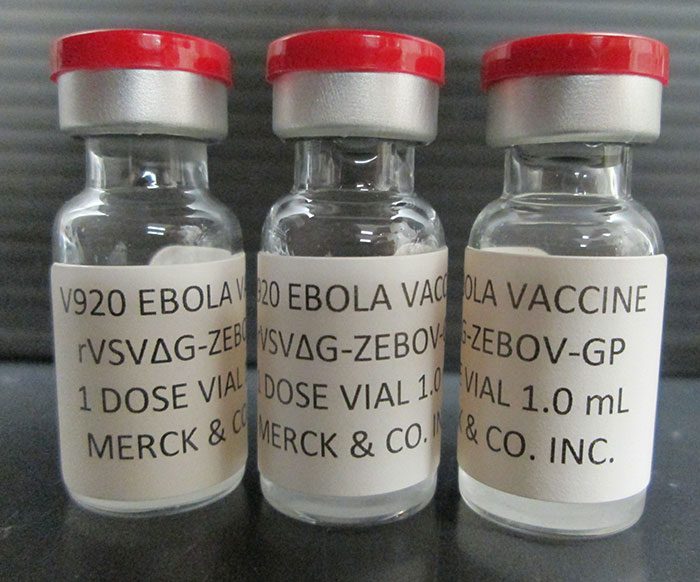Researchers from USAMRIID and WRAIR witness major public health achievement after years of contributions to Ebola vaccine development.
Ask Amy Shurtleff, Ph.D., about her work on the Ebola virus and she’ll use relatively understated terms like “collaborative” and “efficacy.” Dig a little deeper, however, and her excitement eventually reveals itself. Sitting in her office at the U.S. Army Medical Research Institute of Infectious Diseases (USAMRIID), she speaks with the kind of enthusiasm that can only come, one imagines, from witnessing a major scientific achievement in real time.
“It’s nice to be on the end where you can actually see your team’s work make it to the finish line,” she says.
Shurtleff’s team at USAMRIID crossed that so-called finish line in late 2019 when the U.S. Food and Drug Administration (FDA) approved the first vaccine to prevent the deadly Ebola virus disease (EVD). For Shurtleff, a principal investigator on the effort, the achievement marks the end of a six-year scientific journey.
“It’s a fun experience,” says Shurtleff, “because you get this great sense of all these people moving in the same direction to try and accomplish something – and it’s really not just driven by the scientists.”
Through research efforts jointly funded over the years by a slew of agencies – including the Defense Threat Reduction Agency’s (DTRA) Joint Science and Technology Office for Chemical and Biological Defense, the Joint Project Manager for Medical Countermeasure Systems (JPM-MCS), and U.S. Department of Health and Human Services (DHHS) partners – the team at USAMRIID played a key role in developing and testing the initial product (now marketed under the trade name Ervebo), and conducted a series of preclinical trials in animals. Data from those studies highlighted the vaccine’s ability to elicit a robust immune response and, ultimately, to protect against Ebola virus infection. From there, Walter Reed Army Institute of Research (WRAIR) was tapped to conduct Phase 1 clinical trials to show the safety and immunogenicity of the product in humans. Along the way, the accumulated data was evaluated with – and then transmitted to – corporate partner and Investigational New Drug (IND) sponsor Merck & Co., Inc., who ultimately initiated the regulatory approval process for Ervebo.
“For USAMRIID to be a part of the military team taking a product from discovery to human patients is a huge win,” says USAMRIID research scientist John Dye, Ph.D., “and would be impossible without the combined efforts of both institutes.”
“Approval of this vaccine by the FDA represents another important milestone in the global response to Ebola virus disease and stands as a tremendous accomplishment by a unique global partnership,” says Dr. Roger Perlmutter, President of Merck Research Laboratories, echoing Dye’s sentiment.
But while the years-long effort to bring Ervebo to market can be summarized relatively quickly – from the vantage point of the finish line, at least – the global impact is, thankfully, much more difficult to condense. While EVD has been on the global health radar since the 1970s, an outbreak in several West African countries from 2014 to 2016 resulted in more than 11,000 deaths, thereby renewing international awareness in the process of vaccine development. The World Health Organization (WHO) began using V920 – or, the precursor to Ervebo – as an investigational vaccine in 2018 to stem that epidemic tide, with the resulting positive returns now, just a few short years later, setting the stage for even greater benefits on the U.S. home front.
“If we are asked to send [U.S. Service Members] into an endemic area or potentially into an outbreak, having a vaccine to offer these brave Soldiers and their families is paramount,” says Dye. “We need to protect them, so they can protect us.”
Says Shurtleff, “The FDA approval is so important for us in terms of Americans, of United States citizens, for those of us who are pushing forward something for a military countermeasure.”
Those words, in the end, may mark the best example yet of Shurtleff’s slow-burn excitement; a nod towards the impact that her work – and, by extension, the collaborative work performed by WRAIR and Merck as well – will have on the U.S. Warfighter. For both her and the USAMRDC at large, it’s the kind of team victory that encourages everyone involved to push further, faster, and more headstrong into the future of medicine.
“It’s nice to look up from the lab bench and see the impact out there in the global public health arena,” says Shurtleff. “I am certainly looking forward to that feeling, to that sense of accomplishment, again.”
Source: Adapted from U.S. Army Medical Research and Development Command


